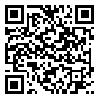BibTeX | RIS | EndNote | Medlars | ProCite | Reference Manager | RefWorks
Send citation to:
URL: http://payavard.tums.ac.ir/article-1-6200-en.html
2- استادیار گروه روانشناسی، دانشکده روانشناسی، دانشگاه آزاد اسلامی، واحد رودهن، رودهن، ایران ,
Background and Aim: E-learning would provide learners with this opportunity. In this study we compared self regulation and academic achievement in traditional and virtual students.
Materials and Methods: This was a cross sectional study among 49 face to face and virtual master students of virtual school of Tehran University of Medical Sciences in 2015, in which the O Nil & Hong’s valid and reliable questionnaire was used to assess self regulation. Also we assessed academic achievement by students' courses mean scores. Data were analyzed by SPSS version 21.
Results: Forty seven students participated in the study. There was no difference between groups considering sex and age. Traditional and virtual students' scores were significantly different only in the “self assessment” factor (P-value= 0.050). There was no difference in other factors of self regulation or academic achievement.
Conclusion: Results of this study showed that e-learning is at least as effective as face to face teaching. On the other hand in some cases has more effects on self regulation factors. So considering e-learning advantages, it is recommended to be used as a suitable substitute.
| Rights and permissions | |
 |
This work is licensed under a Creative Commons Attribution-NonCommercial 4.0 International License. |





